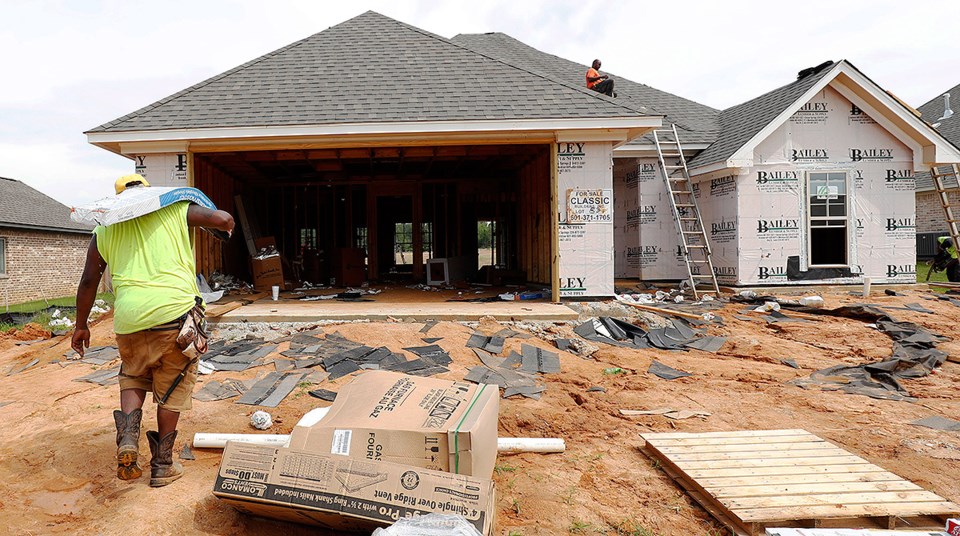THUNDER BAY — Thunder Bay has some rare good news to celebrate on the housing front, becoming one of just a handful of Ontario municipalities to meet new provincial targets for housing starts.
That success comes largely on the back of a large new apartment development, something local leaders hope marks a trend toward more multi-unit builds.
It also means the municipal government is in line to receive funding from the province that was tied to hitting the target, and can be used to support housing development.
City councillors have questioned what impact that funding — expected to be less than a million dollars — can truly have, however.
Of 50 Ontario municipalities that were assigned a target this year, Thunder Bay was one of just nine to achieve it as of Oct. 25, the province’s housing tracker shows.
The city saw 167 new housing units start construction in 2023, beating its provincial target of 161.
Those numbers were bolstered significantly by one 60-unit apartment development on Golf Links Road.
Director of development services Joel DePeuter said the city has issued a permit for a second 60-unit apartment on the same site in recent weeks, which will be reflected in 2024 data.
Wes Case, a local realtor and president of the Thunder Bay Real Estate Board, said he’s encouraged to see the city beating its target this year.
However, he warned there’s heavy lifting ahead if the city is to hit the larger target of 2,200 new units by 2031 that the province set for Thunder Bay.
That would require the pace of home builds to pick up to around 275 units per year, he said.
“There's obviously a lot of work to be done to address the housing shortage,” said Case. “The target of 2,200 new houses by 2031 is a pretty lofty goal, but to hear that we're hitting the 2023 benchmark is definitely good news.”
Some leaders, like Mayor Ken Boshcoff, have called the provincial target ambitious but achievable, given an emerging regional mining boom.
Others are less certain, given Thunder Bay’s recent trend of low growth and challenges like staffing shortages in the construction industry.
Local leaders agree, however, that the municipal government has only limited power to influence housing development, despite being put on the hook for it by the province.
The city had already taken steps like loosening zoning rules, making it easier to build four-plexes, backyard homes, and additions to existing homes.
Case cited a shortage of workers in the construction industry as one potential barrier, even with government subsidies for new home builds on the way.
“I definitely think having a lot more skilled trades and labourers that work in the house-building industry is going to be required,” he said.
“Providing the funding to build these is great, but if you don't have the labour force to actually make these buildings happen then, you know, the money doesn't solve the problem.”
He called expanding the housing supply key to bringing down surging house prices and rental rates.
“If we do have a lot more housing starts… and more affordable apartments, you'll see the person who's lived in their home for 30 years look at renting as a viable option, and those kinds of homes will come up for sale for those first-time buyers who right now aren't having a lot of options.”
The provincial tracker relies on monthly housing data provided by the Canada Mortgage and Housing Corporation. The data does not capture additional units built within existing homes, long-term care homes, or student housing, which the province indicated will be added in the coming months.
The targets are meant to help the province achieve its goal of building 1.5 million new housing units by 2031.
Municipalities that achieve 80 per cent or more of their yearly targets are eligible for a cut of the province’s new $1.2-billion “Building Faster Fund.”
The city has estimated it would be in line to receive just under $600,000 for hitting that 80 per cent threshold, and more for exceeding it.
City councillors have questioned the impact of that level of funding, representing fractions of a percentage point on the city’s annual budget.
The city has its eye on the far more significant federal housing accelerator fund, which leaders hope could deliver up to $50 million to jolt local housing development.
The province tied its housing targets for cities to the controversial imposition of “strong mayor” powers, which Boshcoff requested last month, and went into effect on Oct. 31.
